Anxiety Attack
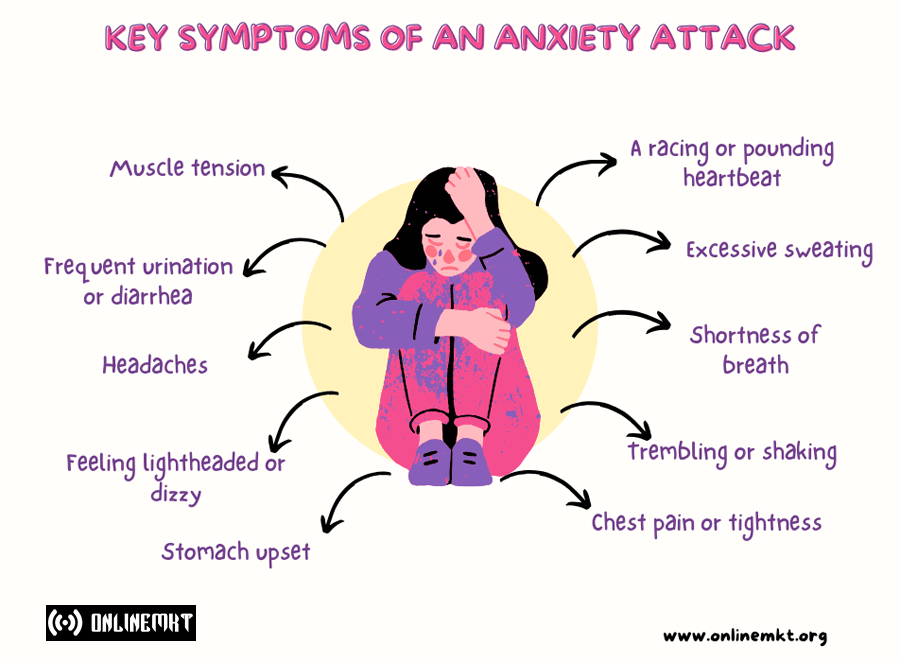
Ever felt like you are having a heart attack, but it is actually just your mind playing tricks on you? That is an anxiety attack. You are not alone if you have ever felt like you are losing control in a perfectly normal situation – anxiety attacks are real and more common than you think.
Anxiety attacks can be overwhelming. Your heart races, your palms sweat, and it seems like your mind is spinning out of control. These attacks can happen suddenly, making you feel lost and helpless.
Key Symptoms of an Anxiety Attack
- A racing or pounding heartbeat
- Excessive sweating
- Shortness of breath
- Trembling or shaking
- Chest pain or tightness
- Stomach upset
- Feeling lightheaded or dizzy
- Headaches
- Frequent urination or diarrhea
- Muscle tension
Coping Strategies for Anxiety Attack
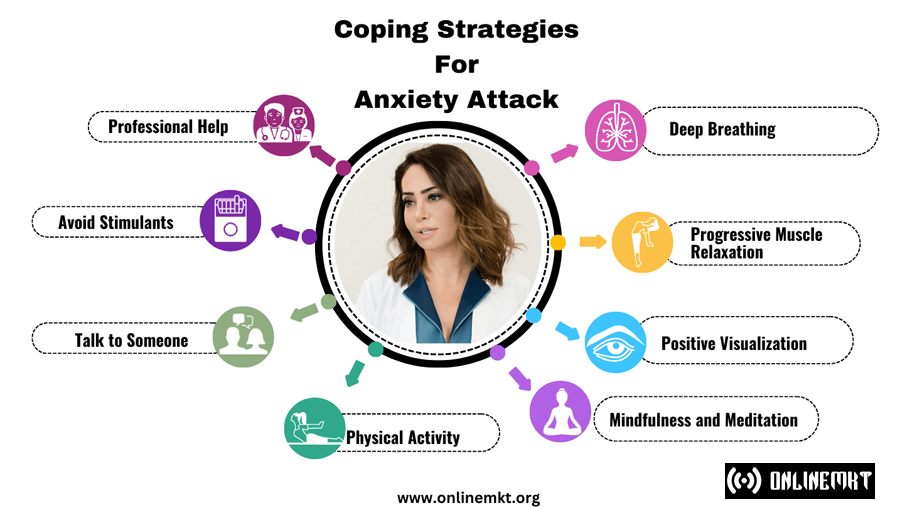
Deep Breathing
Calm your anxiety with deep breathing. Inhale through your nose for four counts, hold for four, and exhale through your mouth for four. This helps activate your body’s relaxation response, countering the fight-or-flight reaction.
Grounding Techniques
Anchor yourself in the present moment with the 5-4-3-2-1 technique:
- Five things you can see
- Four things you can touch
- Three things you can hear
- Two things you can smell
- One thing you can taste
Progressive Muscle Relaxation
Tense and then relax each muscle group from your toes to your head. This promotes physical relaxation and helps you recognize the difference between tension and relaxation
Positive Visualization
Imagine a place or situation that brings you peace. Focus on the details—sights, sounds, and smells. This mental escape can alleviate anxiety by creating a sense of safety and calm.
Mindfulness and Meditation
Observe your thoughts and feelings without judgment. Regular meditation can calm your mind, reduce stress, and improve emotional regulation.
Physical Activity
Exercise releases endorphins, lifting your mood. Even light exercise like walking can reduce anxiety and promote relaxation.
Talk to Someone
Share your feelings with a trusted friend, family member, or therapist. Talking about your experiences can help you process emotions and gain perspective.
Avoid Stimulants
Reduce or eliminate caffeine, nicotine, and other stimulants from your diet. These substances can exacerbate anxiety symptoms.
Professional Help
If anxiety attacks are frequent and disrupt your daily life, seek help from a mental health professional. Therapists can provide tailored strategies like cognitive-behavioral therapy (CBT) and, if necessary, medication.
When to Seek Help
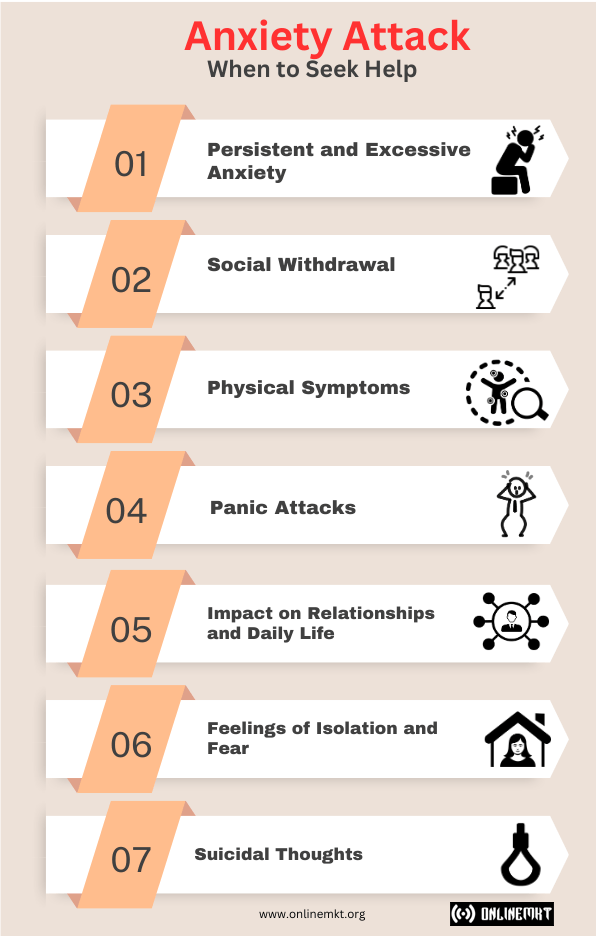
Persistent and Excessive Anxiety
If anxiety interferes with your ability to enjoy activities or perform daily tasks, it’s time to seek professional help.
Social Withdrawal
If you cancel plans, avoid social situations, or isolate yourself, this could indicate a deeper problem.
Physical Symptoms
Frequent symptoms like a rapid heartbeat, dizziness, or chronic fatigue that disrupt your ability to function need medical attention.
Panic Attacks
Sudden episodes of intense fear with physical symptoms like shortness of breath or a racing heart warrant professional help.
Impact on Relationships and Daily Life
If anxiety affects your relationships, work performance, or quality of life, seek help.
Feelings of Isolation and Fear
Overwhelming fear or feelings of detachment from your life are significant signs that support is needed.
Suicidal Thoughts
If you experience thoughts of self-harm or suicide, seek immediate help. This is a medical emergency.
Anxiety Recovery Time
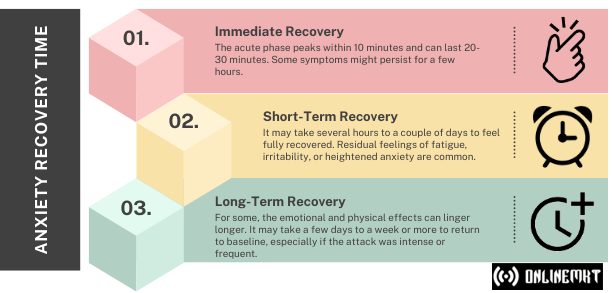
Recovery time from an anxiety attack varies. Here are some general guidelines:
Immediate Recovery
The acute phase peaks within 10 minutes and can last 20-30 minutes. Some symptoms might persist for a few hours.
Short-Term Recovery
It may take several hours to a couple of days to feel fully recovered. Residual feelings of fatigue, irritability, or heightened anxiety are common.
Long-Term Recovery
For some, the emotional and physical effects can linger longer. It may take a few days to a week or more to return to baseline, especially if the attack was intense or frequent.
Factors Influencing Recovery Time
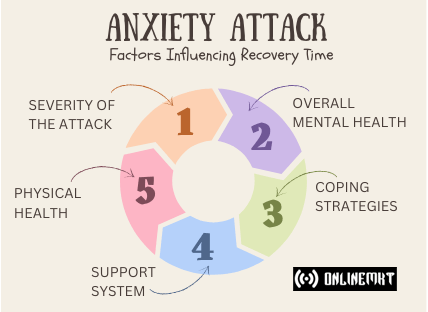
Severity of the Attack
The severity of an anxiety attack plays a significant role in determining the recovery time. If the attack is particularly intense, with overwhelming physical symptoms like rapid heartbeat, shortness of breath, and intense fear, it may take longer for the body and mind to return to a calm state. Severe attacks can leave you feeling drained and exhausted, both mentally and physically, which can prolong the recovery process.
Overall Mental Health
Your overall mental health plays a significant role in how quickly you recover from an anxiety attack. If you have an underlying anxiety disorder or other mental health conditions, such as depression or post-traumatic stress disorder (PTSD), your recovery time may be longer. These conditions can make you more susceptible to anxiety attacks and can also make it harder to manage the symptoms effectively. Seeking professional help and engaging in ongoing treatment can help improve your overall mental health and make it easier to recover from individual attacks.
Coping Strategies
Learning and practicing effective coping strategies can significantly speed up your recovery time. Techniques like deep breathing, mindfulness exercises, and progressive muscle relaxation can help calm your mind and body during an attack. By regularly practicing these strategies, you can train your brain to respond more effectively to anxiety triggers, making it easier to regain control and recover more quickly. Experiment with different coping strategies to find what works best for you and make them a part of your daily routine.
Support System
Having a strong support system can make a big difference in your recovery time. Surround yourself with friends, family members, or mental health professionals who understand what you are going through and can provide emotional support and encouragement. Talking to someone you trust about your feelings and experiences can help you process the anxiety attack and move forward. If you do not have a strong support system in your personal life, consider joining a support group or seeking help from a therapist who specializes in anxiety disorders.
Physical Health
Your physical health can also impact your recovery time from an anxiety attack. If you are generally in good physical condition, with a healthy diet, regular exercise, and adequate sleep, your body will be better equipped to handle the physical stress of an anxiety attack. On the other hand, if you are dealing with chronic health issues, poor nutrition, or lack of sleep, your recovery may take longer. Make sure to prioritize your physical well-being by engaging in regular exercise, eating a balanced diet, and getting enough sleep. Keeping your body healthy can help you bounce back more quickly from anxiety attacks.
Conclusion
Anxiety attacks are common, and there is no shame in seeking support. Surround yourself with people who understand and validate your feelings. Whether it is a trusted friend, a support group, or a mental health professional, having someone in your corner can make all the difference.
Be patient and kind to yourself as you navigate managing anxiety attacks. Progress is not always linear, and setbacks are natural. Celebrate your small victories, and do not be afraid to ask for help when you need it. With time and practice, you will develop strategies that work for you. Remember, you have got this, and better days are ahead. Keep fighting, keep growing, and keep believing in yourself.